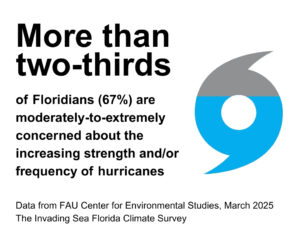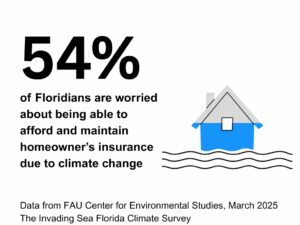Highlights
-
- 90% of Floridians are concerned about hurricanes increasing in strength and/or frequency.
- 38% of Floridians were “extremely concerned,” the highest percentage reporting the top level of concern since the survey started in October 2019. 29% were moderately concerned, 23% were slightly concerned and 10% weren’t concerned at all.
- A majority of Floridians are worried about affordability of homeowners insurance: 54% of respondents agree with the statement, “Climate change has me concerned about being able to afford and maintain my homeowner’s insurance in Florida.”
- 65% of Floridians believe that the state and federal government should be doing more to address the impacts of climate change.
- 83% of Democrats support more federal climate action, compared to 64% of Independents, and 51% of Republicans.
- 83% of Democrats support more state climate action, compared to 61% of Independents and 52% of Republicans.

- 52% of Floridians are more likely to support candidates who fight for climate policy. Democrats (70%) are more likely than Independents (48%) and Republicans (39%) to support candidates who have a political record reducing the impacts of climate change.
- Most Floridians support expanding renewable energy in Florida: 72% of Floridians agree with the statement, “Florida should diversify its energy sources to include more electricity produced by renewable sources.”
- Nearly two-thirds of Floridians support teaching climate science in K-12 schools: 66% support the statement, “Florida schools should teach the causes, consequences, and solutions to climate change in our K-12 classrooms.”
- Approximately 88% of all Floridians believe climate change is happening — 55% believe it is largely due to human activity.
- 90% of Floridians are concerned about hurricanes increasing in strength and/or frequency.
Methodology
CES has conducted the Florida Climate Survey since October 2019 and now does so every spring and fall. The latest edition was conducted in English and Spanish from March 5-7, 2025. The sample consisted of 1,400 Floridians, ages 18 and older, with a survey margin of error of +/- 2.53. The data were collected using an online panel provided by GreatBlue Research. Responses for the entire sample were weighted to adjust for age, race, income, education and gender, according to the 2023 U.S. Census Bureau’s American Community Surveys. It is important to remember that subsets carry higher margins of error. For more information, survey results, and full cross-tabulations, visit www.ces.fau.edu/ces-bepi/ or contact Colin Polsky, Ph.D., at cpolsky@fau.edu.
Editor’s note: FAU’s Center for Environmental Studies manages and provides financial support for The Invading Sea. Banner image: A hurricane-damaged home in Florida (iStock image).



